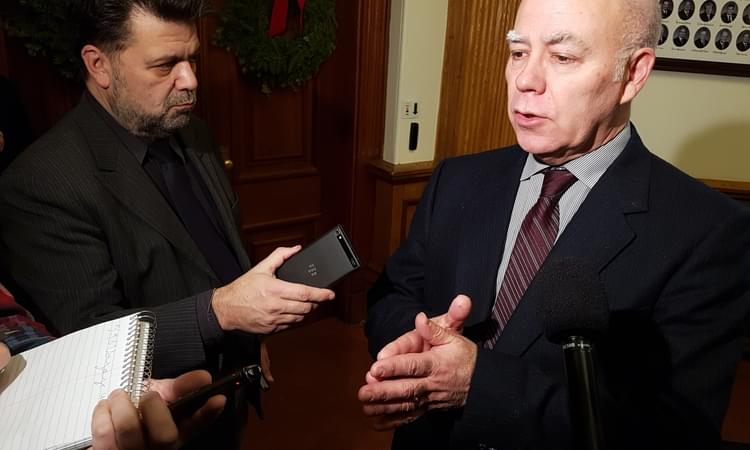Opposition critic wants to know where climate fund money will go – Telegraph Journal – 19 December 2017

Author by : JOHN CHILIBECK Legislature Bureau
Photo by : JOHN CHILIBECK Legislature Bureau
This allows the government to spend money on all kinds of things that will not directly reduce our carbon pollution and directly power the energy transition from fossil fuels to renewable energy. It’s clear. There’s way too much latitude for how those funds will get used rather than its central purpose. – David Coon
Green party leader David Coon tells reporters Tuesday the Liberal government’s climate change fund could be used for the wrong reasons.
FREDERICTON • New Brunswick’s Liberal government is rejecting accusations it is merely shuffling money around when it comes to a new $37-million climate change fund meant to reduce greenhouse gas emissions and help people adapt to a changing environment.
Green party leader David Coon raised the issue in question period Tuesday, pointing out that the bill to create the climate change fund includes a long list of possible items, including cleanup after storms – the kind of action a government would normally be expected to do, with or without a special fund.
“You just have to read the bill – there’s a long list of things the climate fund is designated for,” Coon told reporters afterwards. “This allows the government to spend money on all kinds of things that will not directly reduce our carbon pollution and directly power the energy transition from fossil fuels to renewable energy. It’s clear. There’s way too much latitude for how those funds will get used rather than its central purpose.”
Serge Rousselle, the minister responsible for the environment, said Coon’s criticism was unfounded.
“The bill says clearly everything has to be related to greenhouse gas emission reduction or mitigation and attenuation of climate change effects,” he told reporters. “We’re going to make a budget and $37 million will be targeted toward lowering emissions.”
Pressed by reporters about Coon’s assertions, Rousselle said the government would release details Jan. 31 on budget day that would put the matter to rest.
“What do you want me to say? He’s arriving well before budget time, saying, ‘this will happen and that will happen.’ When the budget comes, we’ll be more than happy to show you that the $37 million will be targeted to combat climate change.”
The Gallant government continues to push ahead with a plan that Ottawa has criticized. The bill to create the climate change fund would see a portion of money generated from the provincial portion of fuel taxes put toward the new fund and take them away from general government revenues, used for public spending and balancing the books.
The move was meant to address the Trudeau government’s call for additional measures to combat climate change.
Ottawa has said the provinces must introduce a price on carbon pollution of $10 per tonne by next year. If they don’t meet that standard, Ottawa will impose its own measures.
New Brunswick plans to put a bigger portion of the provincial gas tax revenues toward the climate change fund as Ottawa’s demands grow. Within four years, New Brunswick says, it will direct more than $100 million to the special climate change fund to meet the federal requirements.
However, last week, federal environment minister Catherine McKenna said the province’s new climate change plan “does not create a new incentive to cut carbon pollution.”
Premier Brian Gallant has defended the plan, saying he’ll “stand up” to anyone who criticizes it.
The biggest opposition party in the house – the Progressive Conservatives – has alleged the disagreement between the two Liberal governments is a ploy to have Ottawa appear to be the bad guy ahead of next year’s provincial election.
Asked repeatedly how New Brunswick will make up the difference once it puts gas tax revenues toward the climate change fund, Rousselle has said his government will find the money.
“In 2014, you may have asked, ‘how are you going to reduce the deficit while investing more in education and health care?’” he told reporters Tuesday. “Well, we did it, and we’ll continue to deliver good budgets.”